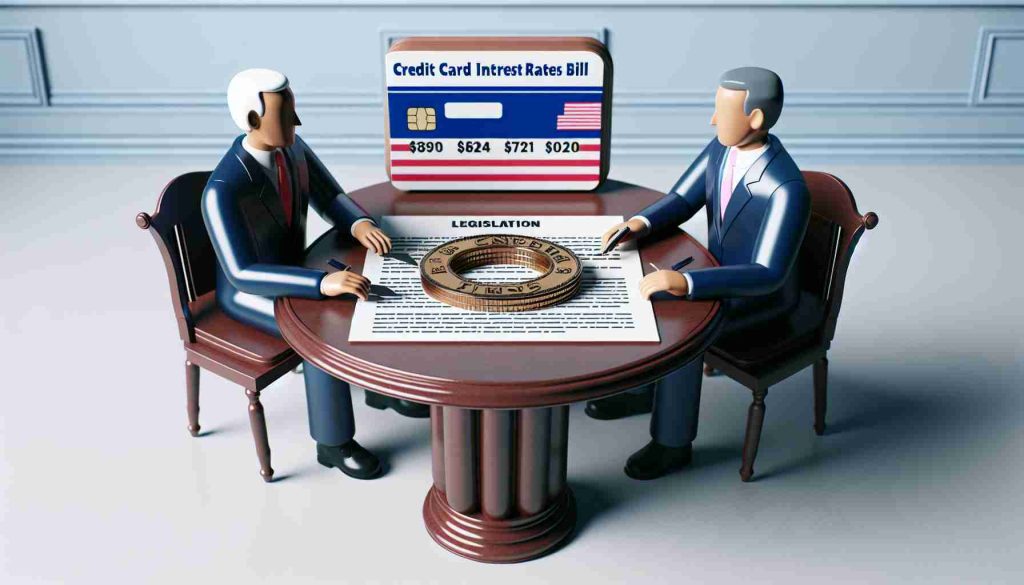- Senators Bernie Sanders and Josh Hawley have introduced a bill to cap credit card interest rates at 10%.
- The initiative aims to protect consumers from high interest rates, which average over 20%.
- Sanders and Hawley frame the excessive charges as similar to loan sharking.
- The proposed legislation would be in effect for five years.
- Credit card debt in the U.S. has reached an alarming $1.17 trillion.
- The proposal faces opposition from industry lobbyists concerned about limiting credit options.
- This bipartisan bill aims to promote financial fairness and consumer protection.
In a surprising alliance, Senators Bernie Sanders and Josh Hawley have teamed up to tackle credit card interest rates, introducing a bold bill that could cap them at just 10%. This groundbreaking initiative comes amid rising frustrations over the soaring average interest rates that exceed 20%, leaving countless Americans drowning in debt.
The lawmakers are driven by a shared mission: to protect consumers from what they describe as outrageous and extortionate rates set by major financial institutions. Sanders blasted the excessive charges as akin to “loan sharking,” emphasizing that it’s time to stop letting big banks profit off the backs of hardworking families. Hawley echoed this sentiment, heralding the proposal as a pragmatic solution for ordinary Americans struggling under a mountain of credit card debt.
Set to last for five years, the legislation reflects a growing demand for financial relief as the nation grapples with a staggering credit card debt of $1.17 trillion as of the third quarter of 2024. However, the proposal faces intense scrutiny from industry lobbyists who argue that such rate caps could restrict credit options for consumers.
This pivotal bill represents not just a potential change in interest rates but a recalibration of financial fairness in America. As debt levels continue to soar, will this bipartisan effort finally turn the tide? The outcome might significantly reshape the landscape of consumer finance. Keep your eyes peeled for updates as the debate unfolds!
Can This Surprising Bipartisan Bill Revolutionize Credit Card Interest Rates?
As Senators Bernie Sanders and Josh Hawley unite over the pressing issue of credit card interest rates, their proposed legislation to cap these rates at only 10% could mark a significant turning point for American consumers. With average rates currently soaring over 20%, this initiative emerges from a deep-rooted frustration with financial practices that many perceive as predatory.
Market Analysis
The legislation comes at a critical time when the staggering credit card debt in the U.S. has reached $1.17 trillion as of Q3 2024. Many Americans, particularly those in lower-income brackets, are struggling to keep up with high interest payments. With inflation and living costs rising, the need for financial relief has never been more crucial. Capping interest rates at 10% could potentially free millions from the burden of spiraling debt and reduce the consumer finance industry’s exploitative practices.
Pros and Cons of the Proposed Legislation
Pros:
– Consumer Protection: Protects consumers from exorbitant interest rates.
– Debt Relief: May reduce overall consumer debt burdens, enabling families to regain financial stability.
– Economic Growth: More disposable income could enhance consumer spending, stimulating the economy.
Cons:
– Potential Credit Restrictions: Industry advocates warn this may limit lending opportunities, making it harder for consumers to obtain credit.
– Financial Institution Responses: Banks may retaliate by increasing fees or tightening credit limits.
– Implementation Challenges: Real-world applications could be complicated and fraught with potential loopholes or unintended consequences.
Innovations and Insights
This bill signals a shift in the legislative approach to financial regulation, reflecting a move towards consumer-focused policies. Consumer advocates are praising this collaboration between traditionally opposing party members, creating new dialogues around financial equity.
Predictions and Trends
If the bill progresses successfully, we could see a movement towards further consumer protection regulations in the financial sector. There is a growing trend towards legislative actions that prioritize consumer rights over corporate profits.
Frequently Asked Questions
1. What is the primary goal of the Sanders-Hawley bill?
– The primary aim is to cap credit card interest rates at 10% to alleviate the financial pressure on American consumers struggling with high interest charges that currently exceed 20%.
2. How might financial institutions react to the proposed interest rate cap?
– Financial institutions may respond by increasing fees, reducing credit limits, or tightening lending criteria to mitigate potential losses from capped interest rates.
3. What are the broader implications of this legislation on the economy?
– If successful, the bill could lead to increased consumer spending and financial stability, potentially fostering economic growth. However, there is a risk of tighter credit markets if lenders become more cautious.
For more detailed analysis and updates on this topic, visit Congress.gov for the latest legislative developments.
